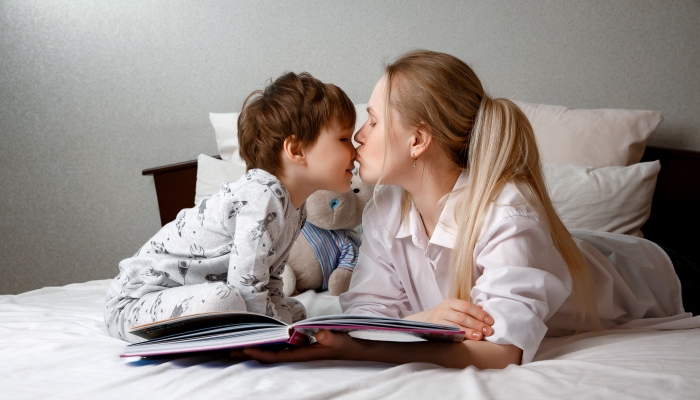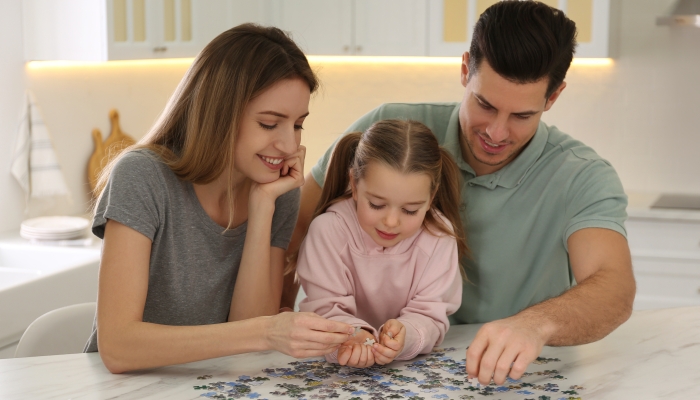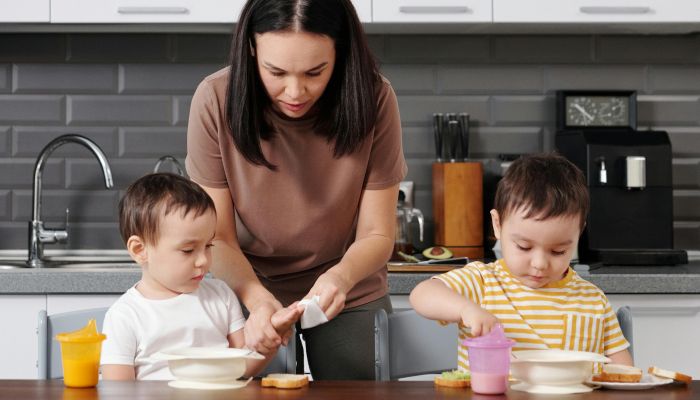Top 4 Parenting Styles Explained

- There are four main parenting styles; authoritative, authoritarian, permissive, and neglectful.
- Authoritative is widely accepted by child psychologists as being the best of the four main parenting models.
- Authoritative parents have high expectations for their kids but a supportive and warm parenting style. Authoritative parents tend to consider their kids as equals rather than seeing them as further down the family hierarchy.
- Parenting is something many people do without thinking, but it is possible to improve your parenting style.
Whether you know it or not, you have a parenting style. Your parenting style cannot be characterized by a single interaction but is a sum of all your parenting behaviors over time. Though many of us would love to ignore our worst parenting days, it’s important to consider them when determining our parenting style.
Your parenting style will impact who your child becomes and how they feel about themselves long into the future. Thanks to decades of research into the significance of parenting styles on child development, we now know the risks and benefits of the different styles.
It’s worth considering your parenting style and how it might impact your kids in the future. While it may sometimes be tough to set and hold boundaries, it’s important to consider the long-term benefits of doing so. Remember, you are your children’s guide and teacher, helping them on their way to adulthood.
Parenting Style: What Is It?
Your parenting style is determined by how you think and feel about children and how they should behave. Your parenting style is how you communicate these views and how they shape your children’s experiences.
The main parenting styles are considered in terms of responsiveness and demandingness. Although responding to your children’s needs is essential, you must also demand high standards from them. Both are vitally important, as focusing on one without the other can be problematic for your child. For example, you don’t want to be a demanding parent who doesn’t respond to your child’s needs or a highly-responsive parent who lets your child do whatever they want.
What Are the Different Types of Parenting Styles?

When people discuss parenting styles in child psychology and child development, they tend to focus on four main types of parenting styles; authoritative parenting, authoritarian parenting, permissive parenting, and neglectful parenting.
Though there are other parenting styles (for example, you might be familiar with terms like “attachment parenting” and “helicopter parenting”), these usually fit neatly within the four main types listed below.
It’s not always straight forward, however, to determine where a parenting sub-type should fit. For example, though attachment parents are highly responsive, if they couple this with low demands they may be more permissive than authoritative. Free range parenting, as another example, could fit into authoritative or permissive, depending on the demandingness of the parent. Helicopter parents could veer more towards authoritarian if they lack warmth and aren’t responsive to the needs of their child.
Authoritative
| Authoritarian
|
Permissive
| Neglectful
|
These main parenting styles were identified by Diana Baumrind as part of her work into child development during the 1960s. Though much research has been done into this field since then, these four styles are still commonly accepted as the four main parenting types.
Most parents ascribe to the authoritative parenting model, with neglectful parents being the smallest category.
Authoritative parents

As you can see from the table, authoritative parenting is seen as the gold standard when it comes to the four parenting styles. Authoritative parents are warm, fair, and good at communicating with their children. They listen to their children and see respect as a two-way street.
Authoritative parents have high expectations for their kids but support them in meeting these expectations. Followers of authoritative parenting see themselves as a guide helping their children to meet their expectations.
Authoritarian parents

Authoritarian parents may see themselves as firm parents. They have high expectations but fail to treat their children as equals. They may say things like, ‘Because I say so’ and expect unconditional respect from their children. Authoritarian parents expect their children to abide by strict rules without question. Authroitarian parents don’t respond to their child’s needs but want to toughen them up. The authoritarian parenting style may sound old-fashioned, but it is still prevalent in many families.
Authoritarian parenting is based on the model of respecting parental authority. I am your parent; therefore, you will do as I say. Little consideration is given to the child’s needs; things are considered purely from the parent’s perspective.
Permissive parents

Permissive parents are sometimes referred to as “indulgent parents.” These parents see themselves as a friend rather than a parent. They avoid conflict and have low expectations for their kids. They don’t offer much support to reach expectations because there are no family expectations. These parents are warm and loving but do not like to disappoint their children.
Permissive parents tend to avoid conflict by letting their kids do what they want. These parents won’t push their kids or hold them to rules. The permissive parenting style isn’t great for kids because it doesn’t teach them how to follow society’s rules or get along with others.
Neglectful parents

Neglectful parents (also known as uninvolved parents) may fail to meet more than their child’s basic needs for food, warmth, and shelter. They are not particularly involved in their children’s lives and offer little in the way of love. Children have little expectations placed on them and receive very little in the form of warmth or support.
Neglectful parents may have their own demons to deal with, for example, mental health issues or addiction. These parents may not be intentionally neglectful but are simply unable to meet the needs of their children.
What Is The Role of Parenting Style in Child Development?
Many parents are interested to know whether parenting style can impact child development. We know from years of research into this field that parenting style has a huge part to play in how your kids turn out. Better parenting styles foster independence, achievement, and better social skills. The poorer parenting styles increase the risk of depression, low self-esteem, and addiction.
According to Types of Parenting Styles and Effects on Children by Magda D Mendez in 2022, parenting styles impact child development. According to Mendez, “Authoritative parenting results in children who are confident, responsible, and able to self-regulate.” Whereas those raised by authoritarian parents “have poor self-esteem, which further reinforces their inability to make decisions.”
According to Parenting Styles and Aggression Among Young Adolescents: A Systematic Review of Literature published in 2019, “Parenting styles have a direct impact on aggression in children. Authoritative parenting styles play a positive role in psychological behavior in children while authoritarian and permissive parenting styles result in aggressive and negative behaviors in children.”
Is It Okay to Have Different Parenting Styles?

Many couples encounter differences in their parenting styles when they have children. Different parenting styles can cause conflict within the home, as each parent believes they are doing it right. Parents who can’t agree on which boundaries to set and how to uphold these boundaries may confuse their kids. It’s important children understand the rules of the family, and if parents don’t know what they are, how are kids supposed to?
If you and your partner have different parenting styles, you’ll need to invest time into figuring out how to deal with this. Look for common ground between your beliefs and parenting styles. Work together to create a list of family rules and discuss how to uphold them. If you are still struggling to work together effectively, therapy may help you to move forward together.
Should My Parenting Style Change As My Child Grows?
Parenting will change as your kids grow. Though the rebellious teenage years have similarities to the toddler years, you will need to adapt your parenting to suit the new stage. That doesn’t mean, however, that you need to switch parenting styles. The individual rules you have for your child will change as they grow, but your overall parenting style should remain the same.
You don’t need to become an authoritarian parent to keep your teenager in line. Nor do you need to give up on your kid and become a permissive parent. No matter the age of your child, you should be able to continue to offer support and be there for them. This doesn’t mean you have to be their buddy, you’re still their parent, but it’s possible to do this without becoming authoritarian.
If you consider authoritative parenting, these parents are usually warm, responsive and hold high expectations for their kids. These parents are supportive while having firm boundaries for their children. The kids know what is expected of them and that their parents are there to help them if needed. During the teenage years, authoritative parents work hard to give their teens the right amount of freedom.
Guide to Choosing the Best Parenting Style for You

In truth, most people probably don’t actively choose a parenting style, they simply fall into whatever feels right for them. While this may seem like a natural way to find your parenting style, it’s important to remember that you are a product of your own upbringing. Think back to your own childhood and how you were parented. Are there things you’d rather not repeat? It helps to actively consider these things so you can come up with alternatives.
If authoritative is the ideal parenting model, how can you move towards this? How do you find the balance between having expectations that are too high (authoritarian) and expectations that are too low (neglectful or permissive parenting)?
The best way to choose a parenting style is to think about how you want to parent. This may sound obvious, but many people stumble into a parenting style based solely on how they react in the moment. Without planning and consideration, you are likely to parent how you were parented. For many of us, this means a more authoritarian parenting model; For those who rebel against how they were parented, a permissive model.
To be an authoritative parent, you should:
- Be warm and offer unconditional love.
- Give your kids space to talk about their problems and emotions.
- Have high expectations for your kids and help them to meet them.
- Give your children plenty of opportunities to make decisions and do things for themselves.
References
- Baumrind, D. (1971). Current patterns of parental authority. Developmental Psychology, 4(1, Pt.2), 1–103. https://doi.org/10.1037/h0030372
- Masud H, Ahmad MS, Cho KW, Fakhr Z. Parenting Styles and Aggression Among Young Adolescents: A Systematic Review of Literature. Community Ment Health J. 2019 Aug;55(6):1015-1030. doi: 10.1007/s10597-019-00400-0. Epub 2019 May 17. PMID: 31102163. Available from: https://www.ncbi.nlm.nih.gov/books/NBK568743/
- Sanvictores T, Mendez MD. Types of Parenting Styles and Effects On Children. [Updated 2022 Sep 18]. In: StatPearls [Internet]. Treasure Island (FL): StatPearls Publishing; 2023 Jan-. Available from: https://www.ncbi.nlm.nih.gov/books/NBK568743/
- Smith, R. S. (2021, March 24). The Child Inside: How Your Childhood Affects Your Parenting. Couple and Family Clinic. Retrieved from https://coupleandfamilyclinic.com/the-child-inside-how-your-childhood-affects-your-parenting/ on May 1, 2023.

Related Posts

Parenting
Sensory Wall Art: 5 Tips to Create a Room Your Blind or Low-Vision Child Will Love
Even if your child can’t see their surroundings, personalizing and decorating their room with thoughtful, sensory-friendly design can make a big difference in their confidence, independence, and joy.

Parenting
4 Tips to Manage Twins Alone as a Single Parent
Taking care of twins alone as a single parent can feel overwhelming. Learn practical ways to help lighten the load.

Parenting
How to Manage Twin Escalation Syndrome
Discover effective strategies for managing twin escalation syndrome, including promoting individuality and fostering positive interactions.